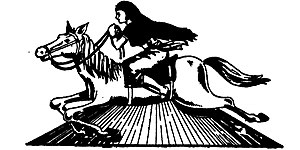Irai Ningthou
| Irai Ningthou (Old Manipuri: Ilai Ningthou) | |
|---|---|
God of Water | |
| Member of water deities | |
 The divine name "Irai Ningthou", written in Meitei Mayek abugida | |
| Other names | Irai Ningthau, Ike Ningthou, Ike Ningthau, Erai Ningthou, Erai Ningthau, Eke Ningthou, Eke Ningthau |
| Affiliation | Meitei mythology (Manipuri mythology) and Meitei religion (Sanamahism) |
| Abodes | Rivers and Lakes |
| Texts | PuYas |
| Gender | Male |
| Region | Ancient Kangleipak (Antique Manipur) |
| Ethnic group | Meitei ethnicity |
| Festivals | Lai Haraoba |
| Consort | Irai Leima (Ireima) |
Irai Ningthou (Old Manipuri: Ilai Ningthou) or Ike Ningthau (Old Manipuri: Ike Ningthou) is a God in Meitei mythology and religion (Sanamahism) of Ancient Manipur (Antique Kangleipak). He is the God and the divine male personification of water.[1][2] He mainly dwells in the rivers and lakes.[2][3] He is the consort of Irai Leima (alias Ireima). The divine couples are regarded as the spirits of the water bodies.[2][4]
Name[edit]
The name "Irai Ningthou" literally means "King of water" or "Chief of water".[5]
Worship[edit]
When a person gets ill after bathing in a water body, people believed that the water spirits (Irai Ningthou and his wife Irai Leima) had caught the person. To get well again, people worship the two deities. For this, the maibas perform the rites and rituals. The offerings include 2 eggs and 7 bamboo vessels filled up with rice paste.[6]
The Thadou people also highly honour the water deities. They offer wild sacrifices like white fowl, pig, dog or he-goat to the God.[7]
References[edit]
- ↑ T C Das (1945). The Purums 1945. p. 247.
- ↑ 2.0 2.1 2.2 (Great Britain), Folklore Society (1913). Publications.
- ↑ T C Das (1945). The Purums 1945. p. 247.
- ↑ T C Das (1945). The Purums 1945. p. 247.
- ↑ T C Das (1945). The Purums 1945. p. 247.
- ↑ T C Das (1945). The Purums 1945. p. 247.
- ↑ T C Das (1945). The Purums 1945. p. 247.
Other websites[edit]
